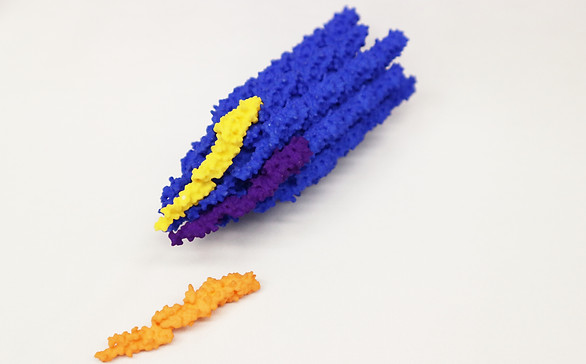
Flagella

Bacterial
Flagella
Filaments and Assembly
Assembly of filamentous proteins is needed for the cytoskeleton, cell motility and macromolecular structures like flagella and hair.
These models slot together from either side to allow students to assemble flagella filaments themselves.
We have used these models to describe:
-
Intermolecular forces allowing protein quaternary structure
-
Macromolecular flexibility
-
Filament assembly
-
Filament capping
Where's the data?
Want to know if using 3D models is effective? We did too. Check out our peer-reviewed publication here.
The Models

Two models
-
Flagella filament base model
-
Flagellin monomer model
All model files provided are to scale and are models of the flagella filament surface. Use caution when printing from .stl files, which are dimensionless.
For classroom purposes, we recommend printing in two colors, then mixing and matching as pictured.
Model design: Brandon Lasalle

Flagella Filament Base
Opens a UNL Digital Commons page with download files at the bottom. Two versions available: .blend and .stl
Note that these models were designed to be printed on an SLS printer. Printers with support material may also work.
Print Filament Base at Shapeways
No 3D printer? Print models with a professional service, they ship to your door.
Model design: Brandon Lasalle

Flagellin monomer
Opens a UNL Digital Commons page with download files at the bottom. Two versions available: .blend and .stl
Note that these models were designed to be printed on an SLS printer. Printers with support material may also work.
Print Flagellin monomer at Shapeways
No 3D printer? Print models with a professional service, they ship to your door.
Model design: Brandon Lasalle


